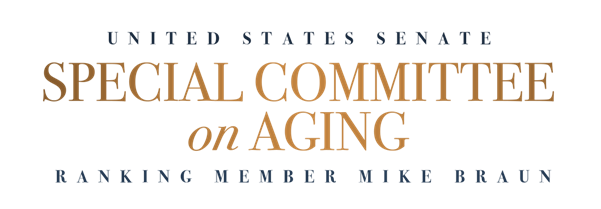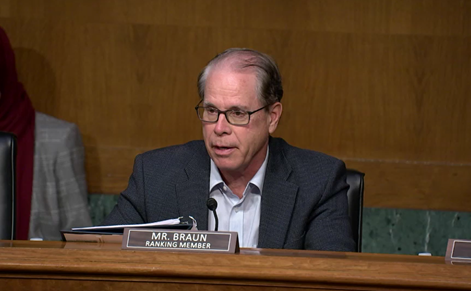Ranking Member Braun’s Opening Statement on the Older Americans Act

FOR IMMEDIATE RELEASE
May 23rd, 2024
Ranking Member Braun’s Opening Statement on the Older Americans Act
WASHINGTON—Today, U.S. Senate Special Committee on Aging Ranking Member Mike Braun and Chairman Bob Casey held a hearing entitled, The Older Americans Act: The Local Impact of the Law and the Upcoming Reauthorization. During the hearing, the Senators examined the critical services provided through the Older Americans Act (OAA) and the impact of OAA programs on local communities.
Remarks as prepared:
Under President Biden, we have seen sky high inflation resulting in prices that are 20 percent higher than when he took office.
All Americans are struggling, but perhaps no one is hurt more by this economic catastrophe than our seniors who are often living on fixed incomes.
Older Americans are finding it harder and harder to stretch their dollars to afford even basic groceries.
The spending of borrowed money by both Republicans and Democrats is only adding fuel to the fire.
This reckless spending is forcing more and more seniors to seek support to make ends meet, while simultaneously putting the federal programs they rely on in jeopardy.
The Older Americans Act (OAA) provides this support, including nutrition, transportation, and health promotion to help older Americans age at home.
As a member of the working group leading the reauthorization of the Older Americans Act, I am committed to preserving flexibility for localities and states to serve seniors.
Every community is different. Seniors are best served when providers on the ground can be entrepreneurial.
The Biden Administration published a Final Rule on the Older Americans Act for the first time in 36 years.
While the Final Rule does codify some OAA requirements, it also includes new regulations that goes beyond the spirit of OAA.
It removes flexibilities from local area agencies on aging, adds administrative burden, and even changes the definition of "Greatest Social Need” to prioritize certain social groups for OAA’s nutrition programs.
I am working to push back against some of the Administration’s regulations.
This includes ensuring that any senior in need of a meal has a fair chance, regardless of which social group they belong to.
I am also working on new proposals to empower AAAs and senior centers to serve older Americans without the need for additional funding.
We should allow states and local service providers to innovate to meet growing nutrition needs, encourage business acumen in the aging network, and invest in cost-effective evidence-informed programs.
I would like to bring much needed transparency by requiring the Administration to summarize state ombudsman long-term care annual reports for Congress and publish a list of all resource centers that it funds.
This will allow Congress to have better oversight over long-term care facilities and ensure that tax dollars are stewarded effectively.
Finally, a recurring theme I hear when traveling through Indiana is the lack of broadband access in rural communities and how it impacts seniors.
I hope that we can address this issue by doing more to connect existing resources to these communities.
I look forward to working with my colleagues and stakeholders to advance these priorities in the Older Americans Act.
###
